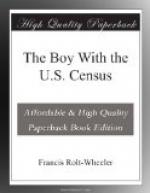“‘Bout the same as potatoes, Ah reckon. But they pay a good price fo’ picked peanuts, an’ Ah can get these boys hyar to do the pickin’. In one o’ the papers Ah saw up to Colonel ‘Gerius’ place the other day, one the gov’nment puts out, thar’s a list showin’ this country has to send to foreign countries fo’ twelve million bushels o’ peanuts every year. Ah’m goin’ to try raisin’ a real big crop, and Dicky hyar,” she added, pointing to the oldest boy, “thinks jes’ as I do about it.”
Hamilton was distinctly impressed with the evidence that this young negro girl and her younger brothers not only knew enough about the peanut business to be able to make it pay, but that they were reading the government bulletins.
“I didn’t know,” he said hastily, “that you people—” and he stopped suddenly, realizing the ungracious ending to his sentence.
“You mean us colored folks,—you didn’t think we troubled ’bout such things? Yas, sah, we don’ have all the advantages o’ white folks but we’re improvin’ right along. Colonel ‘Gerius jes’ does all he can, an’ he gets us gov’nment seeds an’ papers, an’ advises every one fo’ miles aroun’. Yas, sah, we’re gettin’ on. If yo’ have to go to Bullertown, sah, yo’ll fin’ as nice a li’l place as thar is f’om one end o’ the United States cla’r to the other, an’ thar’s not one white person in it.”
“Bullertown?” queried Hamilton in surprise. “I’m glad to hear it, for that’s the next place on my map.”
“We’re all proud of it hyar, sah, an’ it ’pears to me, Bullertown owes jes’ everythin’ to the folks at the Big House and to Mistah Ephraim Jones. Yo’ll see Mistah Jones, sah, an’ I’d take it kindly if yo’ll remember me to him.”
“All right, Delia, I will,” said Hamilton. “Let’s see, I did get all the figures, didn’t I?”
“Yo’ said yo’ had them all, sah,” was the reply.
“Good enough. Well, I guess I’ll go along. I’ll not forget your message. Good-by—” and the boy set his horse on a canter down the narrow road. Throughout the rest of the day the census-gathering was of similar character, and it was drawing toward dark when the boy saw before him a well-ordered array of houses which he felt sure must be Bullertown. Asking his way to the hotel from the first darky that he met, he was answered most courteously.
“Thar’s no hotel hyar, sah,” the negro said, “but Mr. Ephraim Jones entertains the visitin’ strangehs, sah, an’ if yo’ go right on to that big yaller house an’ ask fo’ Mr. Jones, sah, Ah jes’ knows yo’ll be right welcome.”
Hamilton felt diffident about quartering himself upon a perfect stranger in this way, but it seemed to be the custom of the place, and since there was no hotel, there seemed nothing else to do, and he rode on to the gate. Tethering his mare to a tie-post in front of the house he started up the walk, carrying his portfolio, so that in the event of any mistake he might be able to make it appear that he had merely come to take the census. But before he reached the door it was opened by a wrinkled and old, but dignified darky.




